Key takeaways:
- The Palestine Conference fosters dialogue on Palestinian rights, emphasizing shared human experiences through personal narratives.
- Key discussions included the impact of social media on advocacy, the role of youth in activism, and economic empowerment in Palestinian communities.
- Notable speakers, like Dr. Hanan Ashrawi, and contributions from artists highlighted the importance of culture and personal stories in advocacy efforts.
- Attendees gained valuable insights into effective communication strategies and the significance of blending personal stories with digital activism.
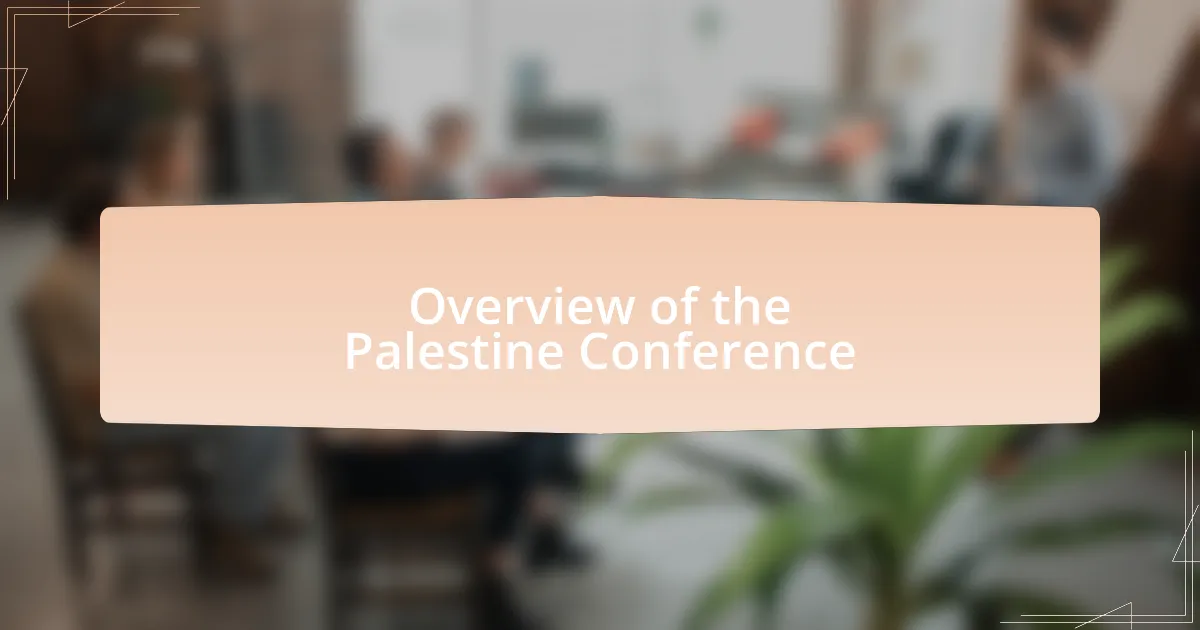
Overview of the Palestine Conference
The Palestine Conference serves as a significant gathering aimed at fostering dialogue and understanding around Palestinian rights and identity. I vividly remember stepping into the conference hall, feeling a palpable sense of unity and passion among attendees, each person driven by shared hopes and dreams for a brighter future.
Throughout the conference, I found myself immersed in a series of thought-provoking discussions that highlighted the complexities of the Palestinian struggle. Did you ever wonder how diverse perspectives can collide in such spaces? My experience showed me that even amidst differing opinions, there was a collective yearning for justice and recognition that resonated deeply.
Engaging with activists and scholars during the sessions was profoundly enriching. Their insights often left me reflecting on my own views and beliefs about the situation in Palestine. It was clear that the conference had a power beyond just information; it sparked connections and encouraged us to reconsider our roles in advocating for change.
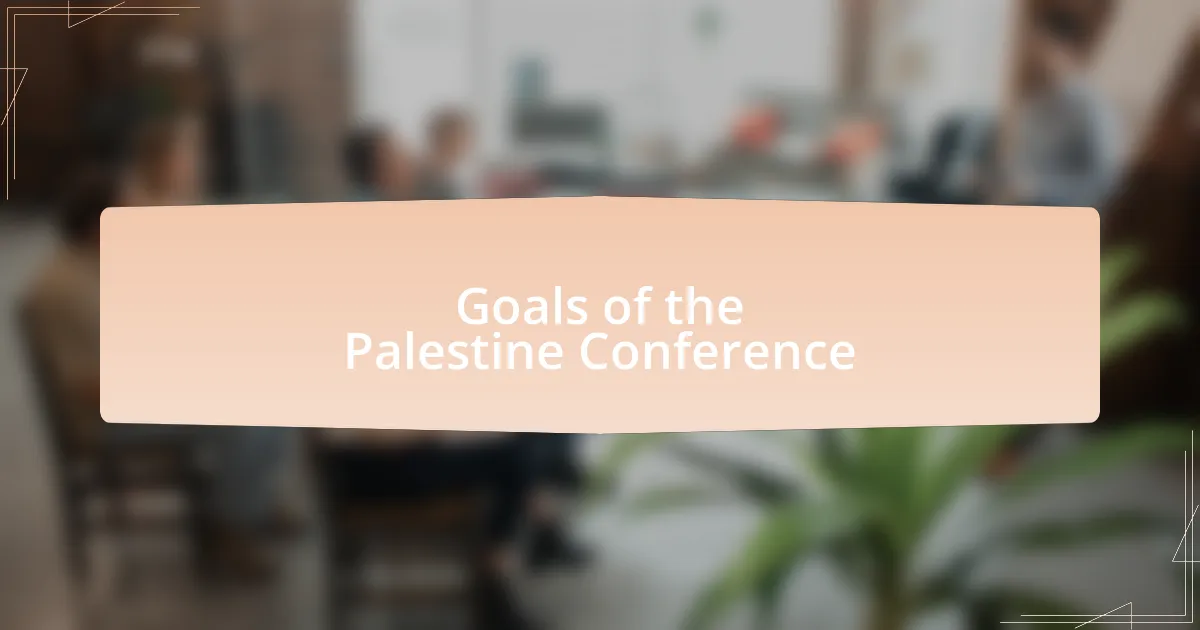
Goals of the Palestine Conference
The primary goal of the Palestine Conference is to raise awareness about the ongoing struggles faced by Palestinians in their quest for rights and sovereignty. I recall one session where a speaker shared their personal story of loss, which resonated with many in the room. It struck me how sharing these narratives can ignite empathy and a deeper understanding of our shared humanity.
Another important objective is to foster collaboration among different organizations and individuals working towards similar humanitarian goals. During a networking break, I saw a group of activists from diverse backgrounds passionately discussing joint initiatives. Witnessing those moments of connection reinforced for me the idea that unity is key; together, we can amplify our voices and create a greater impact.
Lastly, the conference aims to develop strategies for advocacy and empowerment. I remember leaving one workshop feeling inspired and equipped with practical tools I hadn’t considered before. Isn’t it incredible how a single event can shape our approach to advocacy? The energy and commitment I felt in that room encouraged me to take action and share what I had learned, further spreading awareness and promoting change.
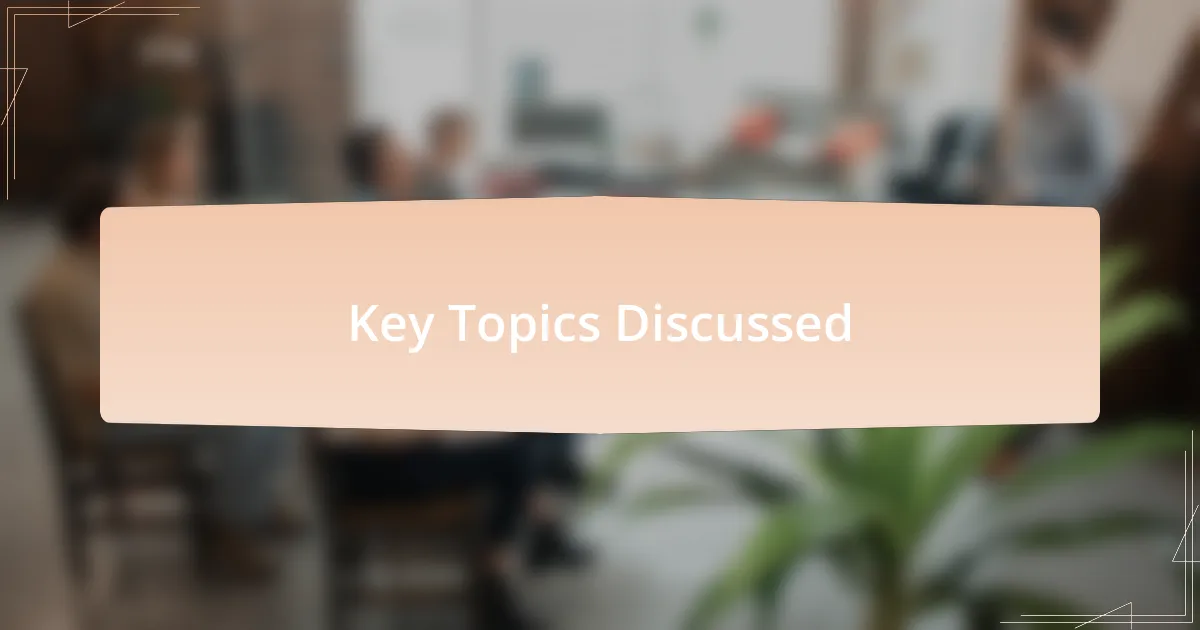
Key Topics Discussed
One of the key topics discussed at the conference was the impact of social media on the Palestinian narrative. I vividly remember a panel where speakers recounted their journeys of using platforms like Twitter and Instagram to share stories that mainstream media often overlooks. It made me ponder: how can a tweet or a post shift public perception and influence global dialogue? The examples presented were powerful reminders of the responsibility we all carry in shaping narratives.
Another significant area of focus was the role of youth in advocating for Palestinian rights. I found it particularly invigorating when a young activist stood up to share their experiences organizing a local protest. Their passion and determination sparked a conversation about the fresh perspectives younger generations bring to activism. It really made me reflect on how vital it is for us to listen to and empower youth voices, as they hold the future in their hands.
Economic empowerment was also a crucial topic during the discussions. At one workshop, participants shared innovative projects aimed at building sustainable businesses within Palestinian communities. I felt inspired hearing these success stories, as they illustrated resilience amid adversity. Isn’t it striking how entrepreneurship can bridge gaps and foster a sense of independence? This topic resonated with many attendees, as it emphasizes that while challenges exist, there are pathways to hope and progress.
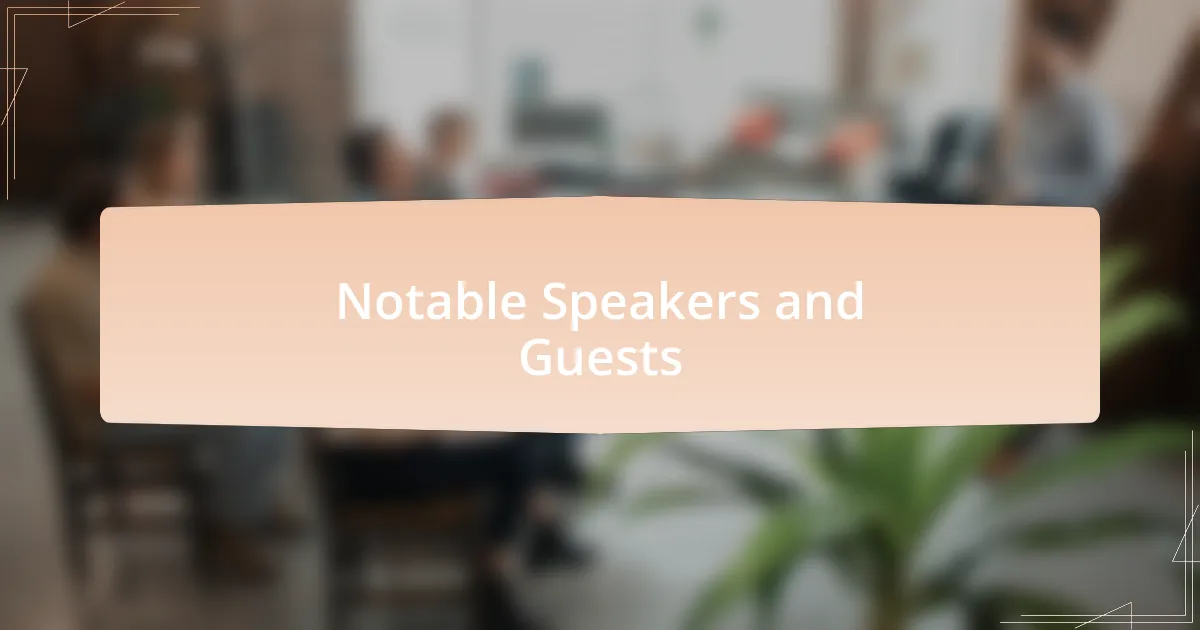
Notable Speakers and Guests
One of the most memorable moments for me at the Palestine Conference was when Dr. Hanan Ashrawi took the stage. Her eloquence and depth of understanding regarding Palestinian history were captivating, and I found myself hanging on every word. Listening to her made me wonder, how often do we get the chance to hear such profound insights from someone who has navigated both politics and activism for so long?
Another notable speaker was a young social entrepreneur whose innovative approach to sustainable agriculture sparked a wave of enthusiasm in the audience. I remember feeling a surge of hope as they shared their journey of transforming local farming techniques to better suit the current climate challenges. It reminded me of the importance of blending traditional knowledge with modern solutions; isn’t it incredible how fresh ideas can revitalize entire communities?
Additionally, there were several esteemed guests who brought diverse perspectives on the Palestinian struggle, including artists and filmmakers. Their contributions highlighted the power of culture in advocacy. I recall a poignant moment when one artist displayed their work, which resonated deeply with the audience, uniting us in shared emotions and experiences. This made me reflect on how art serves not just as a medium of expression but as a pathway to empathy and understanding in our collective story.
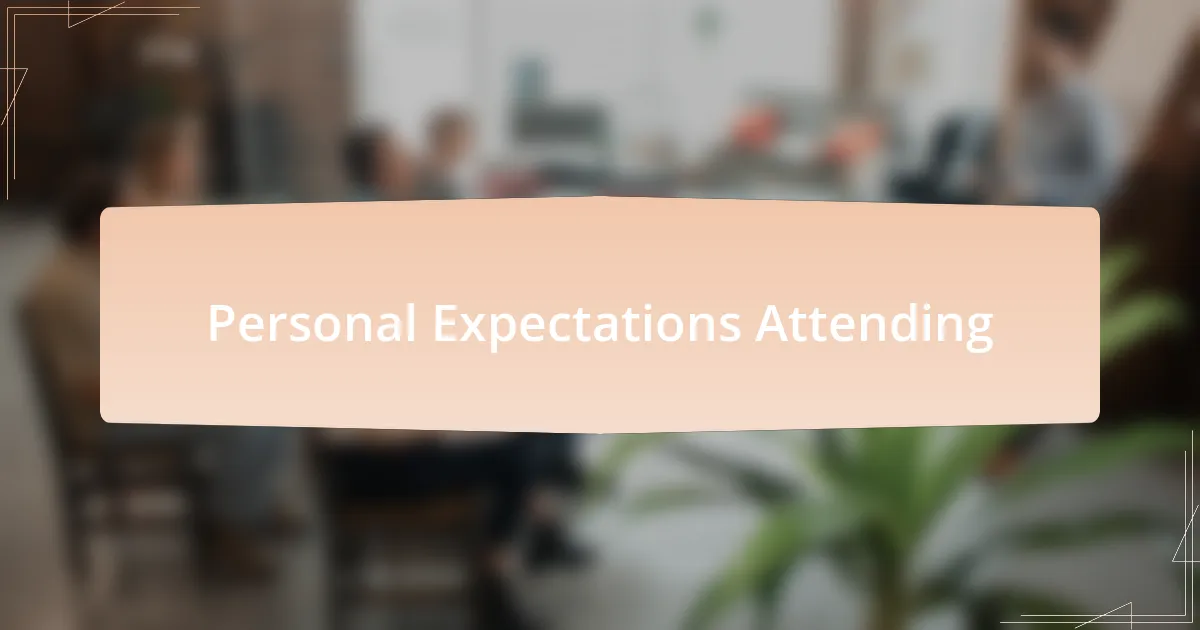
Personal Expectations Attending
Attending the Palestine Conference, I had high hopes for what I would learn and experience. I imagined being surrounded by passionate individuals who shared a commitment to advocating for Palestinian rights. Would the diverse stories and insights from attendees challenge my understanding of the situation? I was eager to see how different voices would come together to articulate a shared vision for the future.
As the event approached, I found myself thinking about the connections I might forge. I hoped that participating in discussions would not only deepen my knowledge but also create bonds with fellow attendees who shared similar aspirations. Would I come away with new friendships, or even a mentor who could guide me in my advocacy journey? These thoughts excited me and fueled my anticipation.
Once there, witnessing the energy in the room was truly uplifting. I saw people from various backgrounds united by their hopes and dreams for Palestine. It felt like every conversation held the potential for inspiration or revelation. My heart swelled with pride as I realized we were part of something much larger than ourselves. Wasn’t it incredible to be in a space where every voice mattered? This experience reminded me that our collective efforts, no matter how small, could lead to meaningful change.
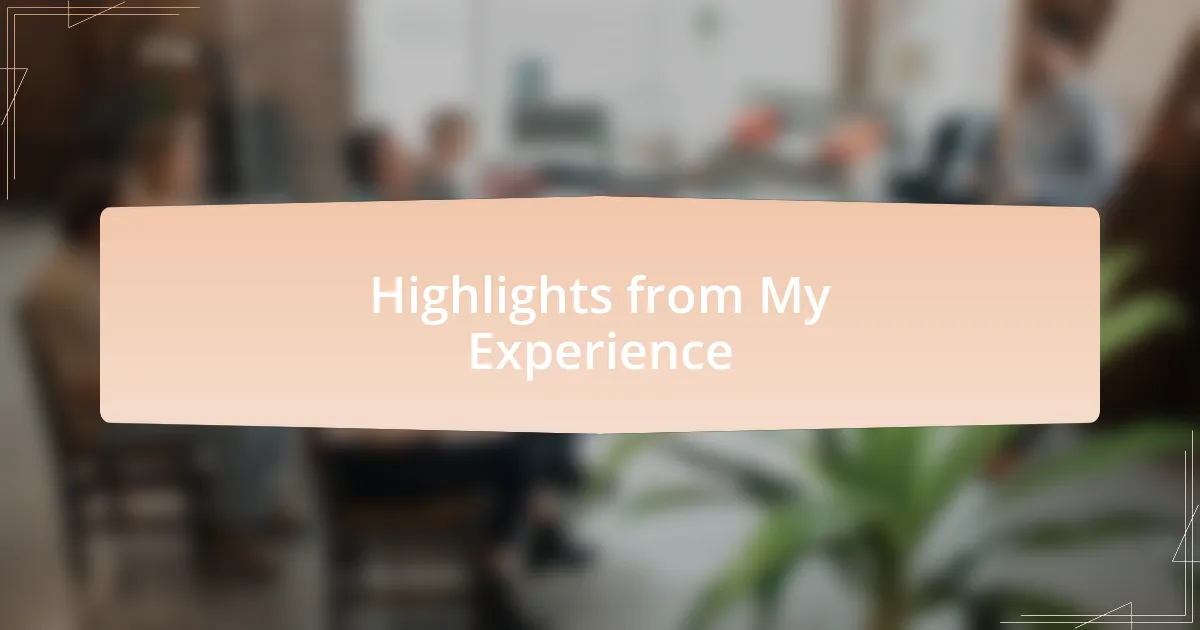
Highlights from My Experience
The panel discussions stood out as a highlight for me. I vividly remember a speaker who shared their personal journey of growing up in Palestine, filled with both despair and resilience. Their story was so compelling that it echoed in my mind long after the session ended. How could one person’s experience encapsulate the struggles and hopes of an entire community? It was a moment of profound understanding for me.
Another memorable experience was connecting with fellow attendees during networking breaks. I spoke with someone who had dedicated their life to grassroots activism. Listening to their passion and determination was contagious. I found myself wondering, could I channel that same energy into my own advocacy? We exchanged contact information, and it felt like we were on the brink of collaboration, ready to make a difference together.
One evening, I participated in a storytelling workshop that encouraged us to express our thoughts creatively. It was enlightening to see various perspectives come to life through art and narrative. How often do we get the chance to share our fears and hopes in such a safe space? I left feeling invigorated—courageous enough to articulate my own voice in the ongoing conversation about Palestine.
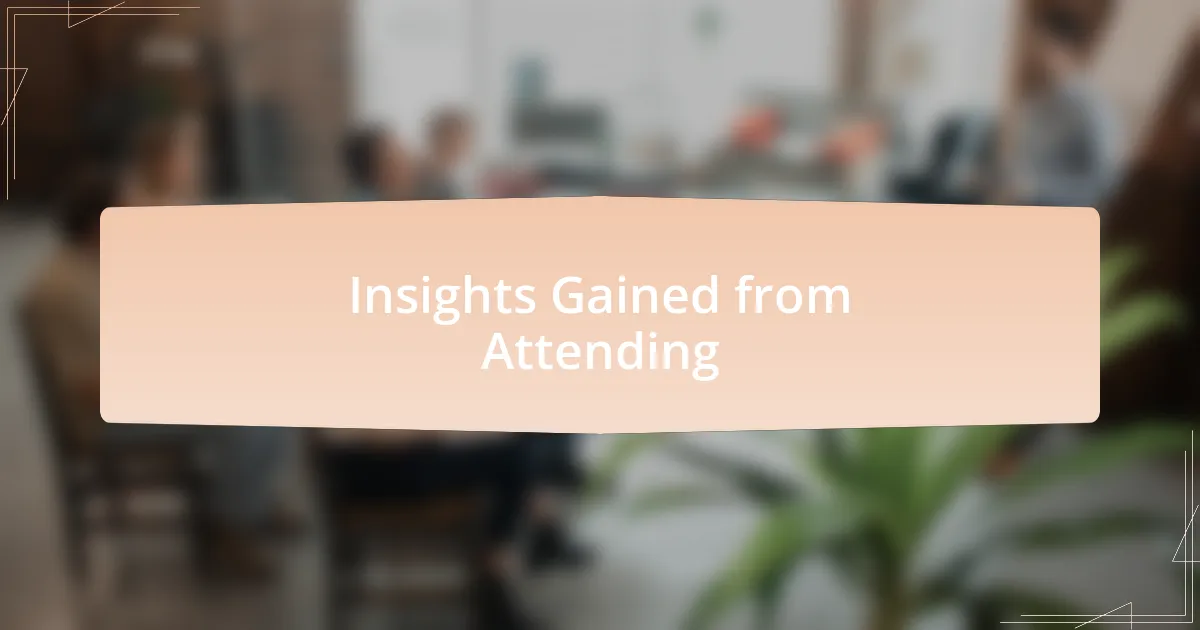
Insights Gained from Attending
Attending the Palestine Conference opened my eyes to the diverse narratives surrounding the Palestinian cause. One discussion I attended featured an academic who presented research on the impact of social media activism. As I listened, I couldn’t help but think about how these digital platforms can amplify our voices, but can they really replace the human connection that personal stories bring? This reflection made me realize the importance of blending both approaches in our advocacy efforts.
Another enlightening moment came during a workshop focused on effective communication strategies. I often struggle with how to articulate complex issues simply and clearly. The facilitator shared techniques that were immediately actionable, and I could see how these could enhance my ability to engage others in dialogue. Have you ever left a session feeling like you’ve gained a toolkit for change? I certainly did, and it instilled in me a newfound confidence to approach conversations about Palestine.
A particularly striking moment for me was during an improvised theater session where participants enacted scenarios reflecting daily life in Palestine. As I watched others embody these experiences, it struck me how performance art can serve as a powerful vehicle for empathy. Why is it so easy to forget the human element in political discourse? That evening, I walked away with a heightened sense of responsibility; I must bring these stories into every space I occupy.